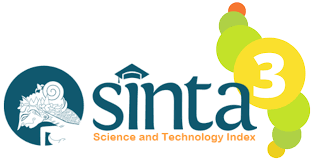The Effect of the Implementation of the ICARE Learning Model on the Physics Learning Outcomes of Students of Class XII IPA
DOI:
https://doi.org/10.53299/jagomipa.v5i2.1470Keywords:
ICARE, Learning Model, Learning Outcomes, PhysicsAbstract
The constructivist approach with educators as facilitators to students is ICARE's learning model because ICARE learning requires students to make introductions, connect new material with previous material, students apply knowledge directly to real problems happening around them, reflect and expand their understanding of the material from educator to student. The purpose of this study is to find out whether there is an influence on students' physics learning outcomes using the ICARE learning model. This study used a quasi-experimental design for 4 meetings. The results of the research obtained in the cognitive realm were in the experimental class (61.63) and the control class (60.35). After the Mann-Whitney test was carried out, an Asym score was obtained. Sig (2-tailed) is 0.573 > 0.05 so, the hypothesis is rejected. Therefore, it can be concluded that there is no significant effect of the application of the ICARE learning model on the learning outcomes of science physics class XII.
References
Adapa, S. (2015). "Three-step approach for developing integrated work-ready assessment tools to foster student's learning and satisfaction." Educational Research and Reviews, 10(9), 1347-1353.
Darwis S. (2022). Improving Physics Learning Outcomes Through the Application of Contextual Learning Models with Inquiry Methods. Journal of Physics Education, 6(3):2302-8939. https://doi.org/10.26618/jpf.
Djamaludin, Ahdar and Wardana. (2020) Learning and Learning. Pare pare: Kaffah Learning Center
Kunandar, (2021). Authentic Assessment (Assessment of Student Learning Outcomes Based on the 2013 Curriculum). A Practical Approach Accompanied by Examples. Jakarta: Rajawali Press.
Mulyasa, E. 2004, Kurikulum Berbasis Kompetensi Konsep, Karakteristik, Implementasi, dan Inovasi, Bandung: Remaja Rosdakarya.
Musri.(2020). The Use of the ICARE Learning Model in Thermodynamics Materials in an Effort to Support Green Technology. The Indonesian Green Technologi Journal, 9(2):2355-4010. https://igtj.ub.ac.id/index.php/igtj
Nuryadi, et al. (2023) Basics of Research Statistics. Yogyakarta : SIIBU MEDIA. http://eprints.mercubuana-yogya.ac.id/id/eprint/6667/1/Buku-Ajar_
Qomari, R., 2008, Pengembangan Instrument Evaluasi Domain Afektif, Jurnal Pemikiran Alternatif Pendidikan, Vol 4, No 1, Hal: 87-109.
Rifa. (2020). Introduction to Research Methodology. SUKA-Press. https://digilib.uin-suka.ac.id/id/eprint
Risda. (2021). The Effectiveness of the ICARE Model to Improve Creative Thinking Skills of Optical Tools. Journal of Studies, Innovations and Applications of Physics Education. 7(1):2460-9587. https://doi.org/10.31764/orbita.v7i1.
Santoso, Singgih, (2024), A Complete Guide to Mastering SPSS 16. Jakarta: Elex
Sugiyono, (2021). Educational Research Methods. Bandung: Alfabeta.
Sukmadinata, (2021). Educational Research Methods. Bandung: PT Remaja Rosdakarya.
Susanto, S.B dan Munoto, 2013, Pengaruh Strategi Learning Start With A Question Terhadap Hasil Belajar Siswa Pada Standar Kompetensi Memahami Sifat Dasar Sinyal Audio di SMK Negeri 2 Surabaya, jurnal Pendidikan Teknik Elektro, Vol 3, No, Hal: 431-434.
Susatyo, E. B., Rahayu S. S. M. dan Yuliawati, R., 2009, Penggunaan Model Learning Start With A Question dan Self Regulated Learning pada Pembelajaran Kimia, Jurnal Inovasi Pendidikan Kimia, Vol 3, No 1, Hal: 406-412.
Downloads
Published
How to Cite
Issue
Section
License
Copyright (c) 2025 JagoMIPA: Jurnal Pendidikan Matematika dan IPA

This work is licensed under a Creative Commons Attribution 4.0 International License.














